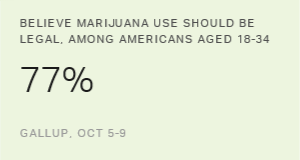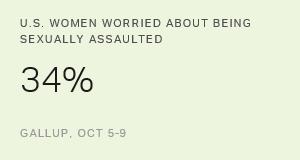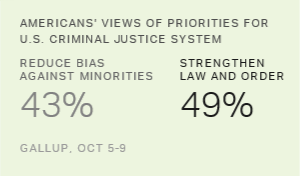Story Highlights
- Percentage who say justice system "not tough enough" shrinks to 45%
- 38% say drug crime sentencing guidelines are "too tough"
WASHINGTON, D.C. -- Americans' views of how the criminal justice system is handling crime have shifted considerably over the past decade. Currently, 45% say the justice system is "not tough enough" -- down from 65% in 2003 and even higher majorities before then. Americans are now more likely than they have been in three prior polls to describe the justice system's approach as "about right" (35%) or "too tough" (14%).

Incarceration rates in the U.S. have soared over the past few decades, and political leaders, justice officials and reform advocates have sought criminal justice reform as a result. With this, Americans' views of the criminal justice system have shifted with the national conversation, with less than a majority now saying the system is "not tough enough." Although considerably higher than in the past, relatively few believe the system is "too tough."
Views of the justice system's toughness vary across racial and political party lines. The majority of Republicans and Republican-leaning independents say it is "not tough enough" (65%), with most of the rest describing it as "about right" (30%). Democrats and Democratic-leaning independents, on the other hand, are most likely to say the system is "about right" (42%), with the rest dividing about evenly between saying it is "too tough" (22%) or "not tough enough" (29%).
A majority of whites (53%) say the system's handling of crime is "not tough enough," while a third (32%) say it is "about right." One in 10 whites say the system is "too tough." Nonwhites -- who as a group make up a disproportionate percentage of the U.S. incarcerated population -- are more than twice as likely as whites to say the system is "too tough" (23%). They are also more likely than whites to say it is "about right" (40%). Meanwhile, 30% of nonwhites say the system's handling of crime is "not tough enough."
| Too tough | Not tough enough | About right | ||||||||||||||||||||||||||||||||||||||||||||||||||||||||||||||||||||||||||||||||||||||||||||||||||
|---|---|---|---|---|---|---|---|---|---|---|---|---|---|---|---|---|---|---|---|---|---|---|---|---|---|---|---|---|---|---|---|---|---|---|---|---|---|---|---|---|---|---|---|---|---|---|---|---|---|---|---|---|---|---|---|---|---|---|---|---|---|---|---|---|---|---|---|---|---|---|---|---|---|---|---|---|---|---|---|---|---|---|---|---|---|---|---|---|---|---|---|---|---|---|---|---|---|---|---|---|
| % | % | % | ||||||||||||||||||||||||||||||||||||||||||||||||||||||||||||||||||||||||||||||||||||||||||||||||||
| Republicans/Republican leaners | ||||||||||||||||||||||||||||||||||||||||||||||||||||||||||||||||||||||||||||||||||||||||||||||||||||
| Oct. 5-9, 2016 | 2 | 65 | 30 | |||||||||||||||||||||||||||||||||||||||||||||||||||||||||||||||||||||||||||||||||||||||||||||||||
| Oct. 6-8, 2003 | 2 | 72 | 25 | |||||||||||||||||||||||||||||||||||||||||||||||||||||||||||||||||||||||||||||||||||||||||||||||||
| Aug. 29-Sept. 5, 2000 | 1 | 79 | 16 | |||||||||||||||||||||||||||||||||||||||||||||||||||||||||||||||||||||||||||||||||||||||||||||||||
| Democrats/Democratic leaners | ||||||||||||||||||||||||||||||||||||||||||||||||||||||||||||||||||||||||||||||||||||||||||||||||||||
| Oct. 5-9, 2016 | 22 | 29 | 42 | |||||||||||||||||||||||||||||||||||||||||||||||||||||||||||||||||||||||||||||||||||||||||||||||||
| Oct. 6-8, 2003 | 9 | 58 | 29 | |||||||||||||||||||||||||||||||||||||||||||||||||||||||||||||||||||||||||||||||||||||||||||||||||
| Aug. 29-Sept. 5, 2000 | 6 | 62 | 27 | |||||||||||||||||||||||||||||||||||||||||||||||||||||||||||||||||||||||||||||||||||||||||||||||||
| Whites | ||||||||||||||||||||||||||||||||||||||||||||||||||||||||||||||||||||||||||||||||||||||||||||||||||||
| Oct. 5-9, 2016 | 10 | 53 | 32 | |||||||||||||||||||||||||||||||||||||||||||||||||||||||||||||||||||||||||||||||||||||||||||||||||
| Oct. 6-8, 2003 | 6 | 67 | 25 | |||||||||||||||||||||||||||||||||||||||||||||||||||||||||||||||||||||||||||||||||||||||||||||||||
| Aug. 29-Sept. 5, 2000 | 3 | 72 | 21 | |||||||||||||||||||||||||||||||||||||||||||||||||||||||||||||||||||||||||||||||||||||||||||||||||
| Nonwhites | ||||||||||||||||||||||||||||||||||||||||||||||||||||||||||||||||||||||||||||||||||||||||||||||||||||
| Oct. 5-9, 2016 | 23 | 30 | 40 | |||||||||||||||||||||||||||||||||||||||||||||||||||||||||||||||||||||||||||||||||||||||||||||||||
| Oct. 6-8, 2003 | 8 | 57 | 28 | |||||||||||||||||||||||||||||||||||||||||||||||||||||||||||||||||||||||||||||||||||||||||||||||||
| Aug. 29-Sept. 5, 2000 | 7 | 57 | 28 | |||||||||||||||||||||||||||||||||||||||||||||||||||||||||||||||||||||||||||||||||||||||||||||||||
| 2000-2016 | ||||||||||||||||||||||||||||||||||||||||||||||||||||||||||||||||||||||||||||||||||||||||||||||||||||
| ║┌┴¤═° | ||||||||||||||||||||||||||||||||||||||||||||||||||||||||||||||||||||||||||||||||||||||||||||||||||||
Americans More Likely to Describe Drug Crime Sentencing as "Too Tough"
Against a backdrop of bipartisan efforts in Congress to reform drug sentencing in 2016, 38% of U.S. adults describe guidelines for sentencing of people convicted of routine drug crimes as "too tough." A slightly smaller percentage say they are "not tough enough" (34%), while a quarter say they are "about right" (25%).
Fifty percent of Democrats say drug crime sentencing guidelines are "too tough" -- twice as high as the percentage of Republicans (26%) who say the same. Republicans are more likely than Democrats to describe drug crime sentencing as "not tough enough" (47%).
Differences in views between whites and nonwhites are less pronounced on drug crime sentencing guidelines compared with their views of the criminal justice system's handling of crime more generally. Both whites and nonwhites have sizable percentages, ranging from 21% to 39%, of those who describe drug crime sentencing guidelines as "too tough," "not tough enough" or "about right."
| Too tough | Not tough enough | About right | No opinion | ||||||||||||||||||||||||||||||||||||||||||||||||||||||||||||||||||||||||||||||||||||||||||||||||
|---|---|---|---|---|---|---|---|---|---|---|---|---|---|---|---|---|---|---|---|---|---|---|---|---|---|---|---|---|---|---|---|---|---|---|---|---|---|---|---|---|---|---|---|---|---|---|---|---|---|---|---|---|---|---|---|---|---|---|---|---|---|---|---|---|---|---|---|---|---|---|---|---|---|---|---|---|---|---|---|---|---|---|---|---|---|---|---|---|---|---|---|---|---|---|---|---|---|---|---|
| % | % | % | % | ||||||||||||||||||||||||||||||||||||||||||||||||||||||||||||||||||||||||||||||||||||||||||||||||
| National adults | 38 | 34 | 25 | 4 | |||||||||||||||||||||||||||||||||||||||||||||||||||||||||||||||||||||||||||||||||||||||||||||||
| Whites | 39 | 35 | 21 | 4 | |||||||||||||||||||||||||||||||||||||||||||||||||||||||||||||||||||||||||||||||||||||||||||||||
| Nonwhites | 36 | 28 | 33 | 3 | |||||||||||||||||||||||||||||||||||||||||||||||||||||||||||||||||||||||||||||||||||||||||||||||
| Republicans/Republican leaners | 26 | 47 | 22 | 6 | |||||||||||||||||||||||||||||||||||||||||||||||||||||||||||||||||||||||||||||||||||||||||||||||
| Democrats/Democratic leaners | 50 | 22 | 26 | 3 | |||||||||||||||||||||||||||||||||||||||||||||||||||||||||||||||||||||||||||||||||||||||||||||||
| Oct. 5-9, 2016 | |||||||||||||||||||||||||||||||||||||||||||||||||||||||||||||||||||||||||||||||||||||||||||||||||||
| ║┌┴¤═° | |||||||||||||||||||||||||||||||||||||||||||||||||||||||||||||||||||||||||||||||||||||||||||||||||||
Bottom Line
Americans' views about the toughness of the criminal justice system have clearly shifted in recent decades, with less than a majority now saying the system is "not tough enough" and more Americans describing it as "about right" or "too tough." Although more than in the past believe the system is overly tough, this view is still held by a relatively small minority. U.S. adults are much more likely, however, to describe drug crime sentencing guidelines as "too tough" compared with their opinions of the system's handling of overall crime, and this is the case among both racial and political party groups.
Reform of drug-related sentencing may be a more agreeable point for larger discussions of criminal justice reform, and this topic seems to have gained some degree of bipartisan traction in the House of Representatives recently.
These data are available in .
Survey Methods
Results for this ║┌┴¤═° poll are based on telephone interviews conducted Oct. 5-9, 2016, on the ║┌┴¤═° U.S. Daily tracking survey, with a random sample of 520 adults, aged 18 and older, living in all 50 U.S. states and the District of Columbia. For results based on the total sample of national adults, the margin of sampling error is ±5 percentage points at the 95% confidence level. All reported margins of sampling error include computed design effects for weighting.
Each sample of national adults includes a minimum quota of 60% cellphone respondents and 40% landline respondents, with additional minimum quotas by region. Landline and cellular telephone numbers are selected using random-digit-dial methods.
View survey methodology, complete question responses and trends.
Learn more about how the works.




